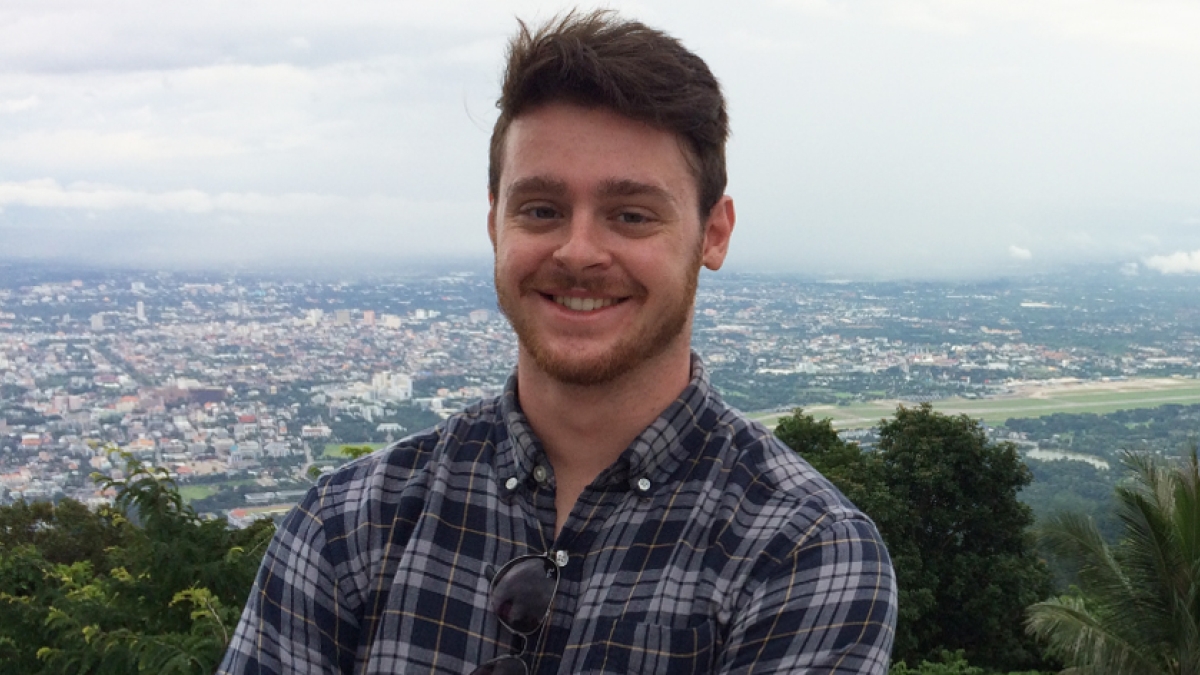Chemistry degree and research experience prepares alumnus for PhD program

Nick Herringer
Editor's note: This profile is part of a series showcasing alumni of the School of Molecular Sciences.
Regaled with tales of science during many walks with his dad in Chico, California, Nick Herringer has known since he was a little kid that he wanted to be a scientist.
In 2018, Herringer graduated from the School of Molecular Sciences at Arizona State University with a bachelor’s degree in chemistry; he is currently doing research at the Biodesign Institute with Matthias Heyden, assistant professor at the School of Molecular Sciences. His project focuses on modelling liquid-liquid phase separation in intrinsically disordered proteins.
“Since joining my lab at ASU, Nick has quickly mastered the art of computer programming and molecular simulation,” said Heyden. “Using this skill set, Nick develops novel multiscale simulation techniques to predict the phase behavior of intrinsically disordered proteins.”
Herringer was attracted to ASU and the School of Molecular Sciences because he always wanted to study chemistry.
“I liked that ASU has so many opportunities to offer because it allowed me to design my undergraduate experience to include the things that were most important to me.”
When asked what it was like getting his undergraduate degree at ASU, Herringer said his experience was great but very busy. Coming from out of state, he spent a lot of time building new connections with friends and trying new clubs. Herringer worked as a server and a tutor during his undergraduate years, but grades were always very important to him.
Getting a chemistry degree helped him prepare for his current position, Herringer said.
“The theory that I learned in my chemistry and physics classes has been indispensable in my research,” said Herringer. “I have also had to learn a variety of different software and computational techniques so I think it would be great if SMS offered introductory classes on computational research techniques.”
Herringer said he had great experiences with many of his professors and found the curriculum to be challenging yet engaging. He described a defining moment in his academic career as when he defended his honors thesis. That moment represented his first successful completion of a research project and gave him a taste of what the next five years of his life will likely look like, as he will be pursuing a PhD in computational chemistry in the fall.
He said that the most useful thing he learned is how to manage his time. During his undergrad, he was constantly pulled between classes, working, having a social life and extracurricular activities, so learning how to balance his schedule and prioritize his responsibilities was crucial: It's one that still applies to his everyday life.
Herringer offered some advice to incoming School of Molecular Sciences students: "If you have an interest, get involved in research early." He regrets not getting involved sooner and would also encourage students to try both experimental and computational research.
More Science and technology

4 ASU researchers named senior members of the National Academy of Inventors
The National Academy of Inventors recently named four Arizona State University researchers as senior members to the prestigious…

Transforming Arizona’s highways for a smoother drive
Imagine you’re driving down a smooth stretch of road. Your tires have firm traction. There are no potholes you need to swerve to…

The Sun Devil who revolutionized kitty litter
If you have a cat, there’s a good chance you’re benefiting from the work of an Arizona State University alumna. In honor of…

